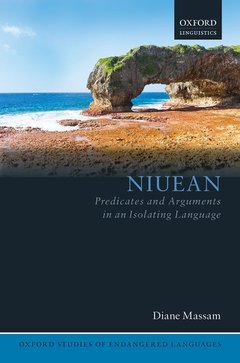Description
Niuean
Predicates and Arguments in an Isolating Language
Oxford Studies of Endangered Languages Series, Vol. 6
Author: Massam Diane
Language: English
Subject for Niuean:
Publication date: 04-2020
384 p. · 16x23 cm · Hardback
384 p. · 16x23 cm · Hardback
Description
/li>Biography
/li>
This volume explores the grammar of Niuean, an endangered Polynesian language spoken on the island of Niue and in New Zealand, with a focus on the issue of predication. Since Aristotle, it has been claimed that a sentence consists of a subject and a predicate. Niuean constitutes the perfect testing ground for this claim: it displays verb-subject-object word order, in which the subject interrupts the predicate, and has an ergative case system, in which subjects are not clearly distinguished from objects in their marking for grammatical case. Diane Massam uses the framework of generative grammar to carry out a detailed analysis of the internal structure of Niuean predicates and arguments, as well as the relations between them, touching on many other topics including the nature of displacement, word formation, determiners, and thematic roles. The proposal is that Niuean complex predicates are formed via successive inversion, prior to the merge of all arguments (high argument merge), and that the predicate undergoes fronting to initial position across the arguments, with the same structure found also in nominal clauses. The conclusion is that Niuean does not have a subject in the usual sense, and this is related to the fact that the language has isolating morphology, lacking all tense and agreement inflection and nominative case. Instead, the language exhibits low absolutive predication, applicative ergative agents, and predicate fronting in lieu of subject extraction. The book extends our understanding of cross-linguistic sentence structure and grammatical case, and will be of interest to scholars in the fields of Austronesian linguistics, typology, and theoretical linguistics.
Diane Massam is Professor Emeritus in the Department of Linguistics at the University of Toronto, where she has also served as Chair. She has been an Erskine Fellow at the University of Canterbury, Honorary Research Fellow at the University of Auckland, and visiting professor at Harvard University, and has served as President of the Canadian Linguistic Association, as well as on several editorial boards. She currently holds an Insight Grant from the Social Sciences and Humanities Research Council of Canada to research Niuean argument structure. Her main research interests are argument structure, case, predication, and word order, with a focus on the Niue language and on register in English, and she has published extensively on these topics in journals and edited volumes. She is the editor of Count and Mass Across Languages (OUP, 2012) and, with Jessica Coon and Lisa deMena Travis, of The Oxford Handbook of Ergativity (OUP 2017).
© 2024 LAVOISIER S.A.S.
These books may interest you

Parameters of Predicate Fronting 104.06 €

Parameters of Predicate Fronting 63.08 €


